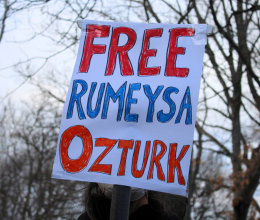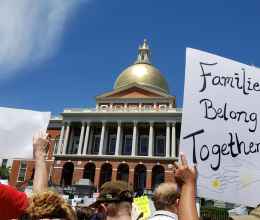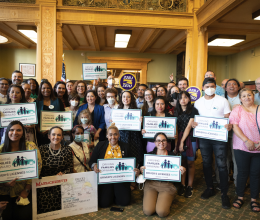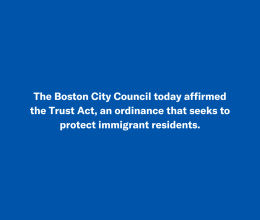
In Trump’s hands, the census becomes a weapon
Blog by Steven K. Choi, Executive Director, New York Immigration Coalition. Originally published in ACLU's Speak Freely.
Almost a decade ago, I ran the Minkwon Center for Community Action, a grassroots organization serving the Korean-American community in Queens. Getting immigrants to participate in the 2010 census was one of our top priorities. Why? Because I knew we could use the census to build power for our communities, just by standing up and being counted. And we did, but it wasn’t easy.
First, we had to educate people about the census's importance. After all, it's not just a head count. The census determines how billions of federal dollars are allocated on a state and national level, and it is also used to draw political districts, thus determining political representation.
Our educational effort required breaking down communication barriers by organizing volunteers and literature that could reach the 40 different languages and dialects that people speak in our section of Queens. It also meant addressing the real fears that immigrants, particularly those of color, have about turning personal information over to the government. We spent months knocking on doors, meeting with community members, and holding trainings to overcome these challenges.
But once we broke it down for them, our community realized that the census could indeed be a powerful tool not only to ensure that our communities got the federal dollars they needed but also to build our political power. The end result was the creation of three Asian-American-majority political districts and the election of Rep. Grace Meng — a true champion for our communities — to New York’s first-ever Asian American-plurality congressional district.
Now, nearly 10 years later, I am preparing for the 2020 census, this time as the head of the New York Immigration Coalition, which represents over 200 immigrant and refugee rights groups throughout the state.
I wish I could say that we’re building upon the last decade’s progress, but unfortunately, we will have to work much harder to make the same case. For the first time in 70 years, the Trump administration had added a citizenship question to the census, which is a surefire way of scaring immigrants away from participating.
Immigrant communities of color, who historically have been reluctant to engage with government officials, are even more reluctant now — and for good reason. Whether it is the Muslim ban, the rescission of DACA for Dreamers, or proposing to end family-based immigration, the Trump administration has shown hostility to immigrant communities at every turn.
By adding a citizenship question to the decennial census, the Trump administration is taking a campaign to intimidate and marginalize immigrants into the homes of every New Yorker. The citizenship question threatens to put all immigrant respondents, as well as their families, loved ones, and neighbors, in a bind: Identify your status to a hostile administration or risk the loss of critical federal resources and political power.
Our member organizations have already witnessed the ripple effect. For example, at the Chinese-American Planning Council’s childhood development program, parents have been asking staff whether “the law” requires them to fill out the census and about the penalties for not answering. They also ask what would happen if they don’t answer a question during an in-person visit or if ICE would drop by if they indicate that there is a noncitizen living in their home.
Should the citizenship question go forward, the state of New York could suffer a huge loss of resources and political power if immigrants are too scared to participate.
That’s why we’re working to combat Trump’s attack. Together with over 80 partners statewide, we’ve formed New York Counts 2020, a coalition to maximize participation in the census and began our census education and outreach efforts in March. We’ve spent at least $93,000 on census-related activities this year that we would not have otherwise.
In June, we became plaintiffs in a federal lawsuit brought by the ACLU challenging the addition of the citizenship question, alongside four other immigrants’ rights groups.
The Trump administration has attempted many times to stop the lawsuit, but the courts have repeatedly denied each request. In the course of the suit, we’ve found that the citizenship question has the fingerprints of Steve Bannon, Trump’s former senior adviser, and Kris Kobach, the Kansas secretary of state, all over it. Both of them have advanced the White House’s anti-immigrant agenda.
The trial begins on Monday, and we’re packing every inch of that courtroom. Those who try to circumvent the constitutionally mandated count of all people living in the United States, regardless of immigration status, must be held accountable.
Related content


Court Rules Rümeysa Öztürk’s Lawsuit Should Move Forward in Vermont
April 4, 2025
Court hears arguments on the unconstitutional ICE detention of...
April 3, 2025In New Filing, Rümeysa Öztürk Urges Court to Protect Her Rights,...
March 28, 2025
Federal Court Blocks Trump Birthright Citizenship Executive Order
February 10, 2025
Court approves settlement in ACLU of Massachusetts immigration lawsuit
January 16, 2025
Know Your Rights: Family Preparedness Plan
January 13, 2025
Know Your Rights: Work and Family Mobility Act (WFMA)
January 13, 2025